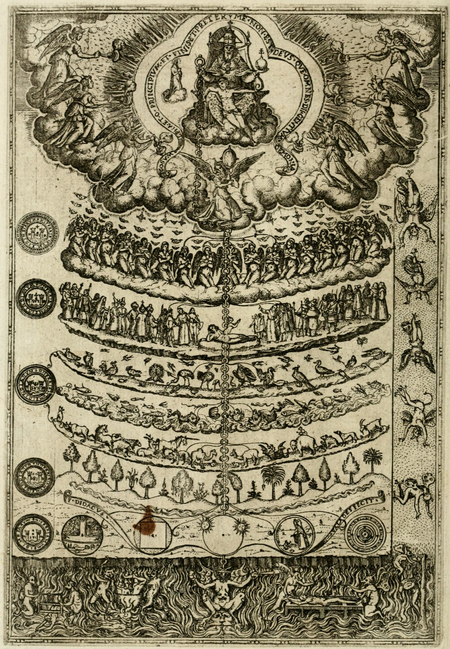Elements of Theology, Proposition 28
Jul. 14th, 2024 10:09 am Every producing cause constitutes things similar to itself, prior to such as are dissimilar.
For since that which produces is necessarily more excellent than the thing produced, they can never be simply the same with each other and equal in power. But if they are not the same and equal, but different and unequal, they are either entirely separated from each other, or they are both united and separated. If, however, they are entirely separated, they will not accord with each other, and nowhere will that which proceeds from a cause sympathize with it. Hence, neither will one of these participate of the other, since they are entirely different from it. For that which is participated gives communion to its participant with reference to that of which it participates. Moreover, it is necessary that the thing caused should participate of its cause, as from thence deriving its essence.
But if that which is produced is partly separated from and partly united to its producing cause, — if, indeed, it experiences each of these equally, — it will equally participate and not participate: so that in the same manner it will have essence and not have it from the producing cause. And if it is more separated from than united to it, the thing generated will be more foreign than allied to that by which it is generated, will be more unadapted than adapted to it, and be more deprived of than possess sympathy with it. If, therefore, the things which proceed from causes are allied to them according to their very being, have sympathy with them, are naturally dependent on them, and aspire after contact with them, desiring good, and obtaining the object of their desire through the cause of their existence—if this be the case, it is evident that things produced are in a greater degree Med to their producing causes than separated from [28] them. Things, however, which are more united are more similar than dissimilar to the natures to which they are especially united. Every producing cause, therefore, constitutes things similar to itself prior to such as are dissimilar.
COMMENTARY
This proposition is the basis of a concept with which I believe most of us are familiar, that is, what was in medieval times called the Great Chain of Being. This was a universal concept in the European middle ages and through the early modern period. It is the image of the Universe hierarchically ordered, with God at its apex; angels following God in their successive orders; man after the angels; and, below Man, the beasts, plants, and minerals.

The basis of this whole idea is the very simple concept that every producing cause produces things similar to itself before things which are different from itself. In Pythagorean terms, the One first produces the duality of the One and the Dyad. These two, which are also Limit and Unlimited, then bring forth the Mixture, which is Being Itself. The Neoplatonists-- or some of them-- mythologically identified these principles with Chronos, the First One, bringing forth the dyad of Aether and Chaos, and then, in cooperating with Aether, producing a cosmic egg. The egg itself is an image of being, as it is a simple and limited form in which resides unlimited potentiality. From these, the whole panoply of deities of whom we've heard emerge. From the Gods are emanated angels and daimones, human souls, animals, plants, and minerals, down to the last of things.
COMMENTARY
This proposition is the basis of a concept with which I believe most of us are familiar, that is, what was in medieval times called the Great Chain of Being. This was a universal concept in the European middle ages and through the early modern period. It is the image of the Universe hierarchically ordered, with God at its apex; angels following God in their successive orders; man after the angels; and, below Man, the beasts, plants, and minerals.

The basis of this whole idea is the very simple concept that every producing cause produces things similar to itself before things which are different from itself. In Pythagorean terms, the One first produces the duality of the One and the Dyad. These two, which are also Limit and Unlimited, then bring forth the Mixture, which is Being Itself. The Neoplatonists-- or some of them-- mythologically identified these principles with Chronos, the First One, bringing forth the dyad of Aether and Chaos, and then, in cooperating with Aether, producing a cosmic egg. The egg itself is an image of being, as it is a simple and limited form in which resides unlimited potentiality. From these, the whole panoply of deities of whom we've heard emerge. From the Gods are emanated angels and daimones, human souls, animals, plants, and minerals, down to the last of things.